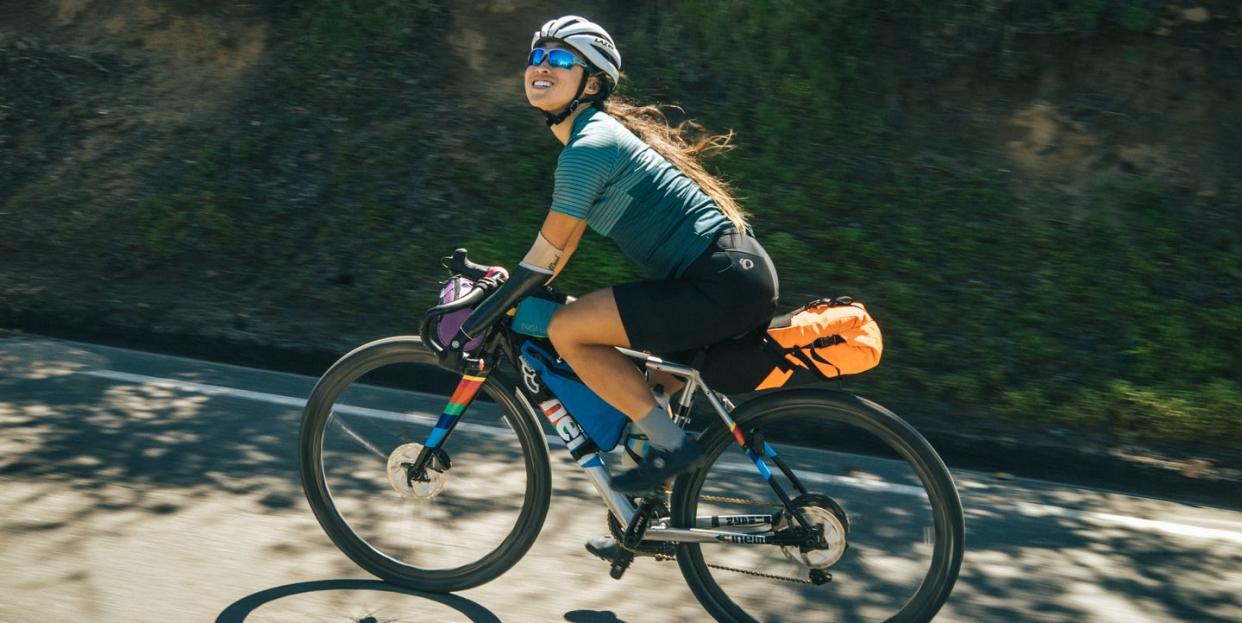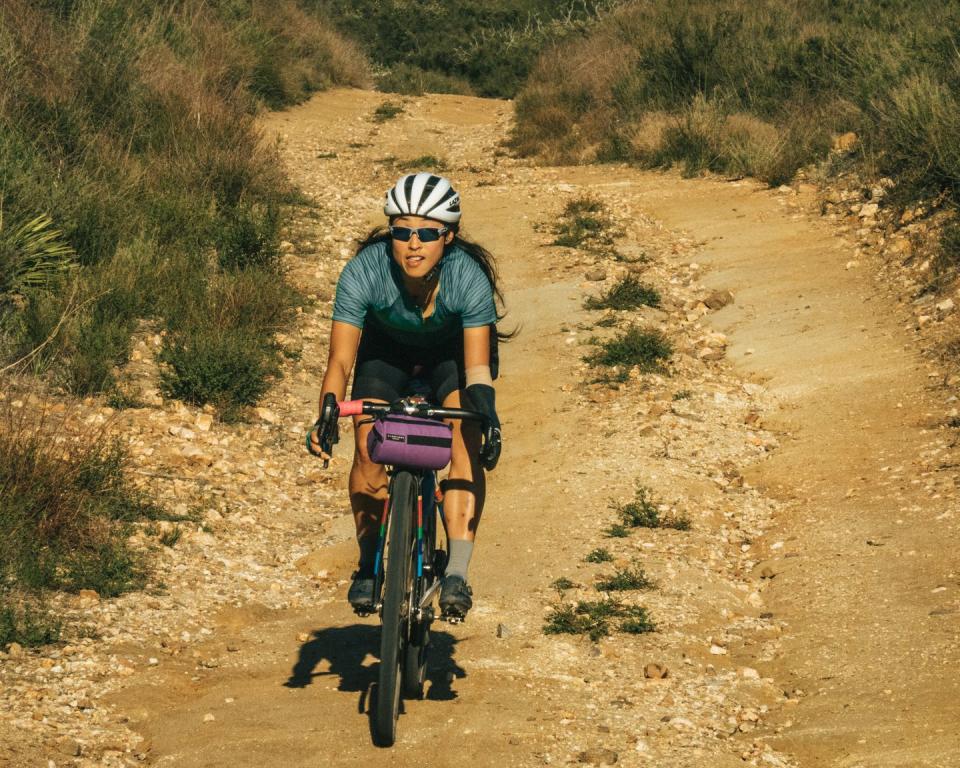Josie Fouts Started Bike Racing on a Whim. Now She’s Contending for the Paralympics

- Oops!Something went wrong.Please try again later.
When Josie Fouts first matched with Taylor Warren on Tinder in 2016, she was excited to meet the cute guy with a tumbleweed head of hair and a handsome grin. But she never would have guessed that a dating app could help her discover a passion for bikes and a new definition of self-love.
At the time, Fouts was earning her master’s degree in nutritional sciences and gut health, and commuting a mile to school at Colorado State University on her beat-up beach cruiser. Before their first date, Warren—a full-time cycling coach and an aspiring pro bike racer—showed Fouts around the house he shared with a few roommates in Fort Collins, Colorado.
Warren’s garage housed 26 bikes that belonged to Warren and his roommates. Eventually, Fouts’s beach cruiser brought the garage’s official bike count to 27.
“There was this glow around him that just reeked of health and happiness, which was very attractive to me,” Fouts said.
→ Get Bicycling All Access for the latest cycling news and health tips!
Fouts, who was born missing her left hand, never let that stop her from riding her bike—or doing anything she wanted, really. She washed dishes, tied her shoes, and cooked for herself without relying on any adaptive equipment, even if going without was extremely uncomfortable. She nixed the idea of wearing a prosthetic hand while riding, opting to tip her left shoulder forward and rest her stub on the handlebar.
“No matter what anybody told me, [my mentality] was mind-over-body,” Fouts said, “and I would just make it work.”

After graduation, Fouts got a job as a researcher at a microbiome lab in San Diego, and the she and Warren moved to the West Coast. She upgraded from the beach cruiser to a speedy Cannondale hybrid so she could continue to commute by bike, which was now 28 miles round trip. Work became more demanding, and soon she was doing that ride seven days a week.
As the miles piled up, Fouts started to pay more attention to the conversations she’d overhear Warren having with his athletes. “I started pacing myself instead of trying to go as fast as I could all the time,” Fouts said. “Eventually, I had all this base [fitness].”
Warren also started to take her on group rides with other local riders. On one such group ride in September 2018, Fouts met Team USA paracyclist Cody Jung. After the ride—which was not an easy ride, Fouts later learned—Jung stopped her and suggested that she could ride bikes full time, if she wanted to. And Fouts immediately thought of what she often said to Warren, when he considered quitting on his bike racing dreams to go back to school and get a job.
“I’d tell him, ‘No way—this is something you can’t go back and do. You can always go back to school, you can always go get a normal job,’” she said. “So when the opportunity presented itself to me, it was like, ‘Alright Josie, did you really mean what you said?’”
So Fouts quit her job at the lab the next day.
Two months of laser-focused training later, with Warren as her coach, Fouts arrived at the U.S. Paralympics Track Cycling National Championships in Colorado Springs in December 2018, where she won gold in both the 3-kilometer individual pursuit and 500-meter time trial, and set a national record in the flying 200-meter time trial. On the top step of the podium, with one hand and one stub in the air, Fouts smiled her huge, infectious smile, and knew she was exactly where she was supposed to be.

With the Tokyo Olympics a year and a half away at this point, she zeroed in on making the Paralympic cycling team in 2020. Warren wrote her a training plan, and for the next 14 months, Fouts put in consistent weeks of specific training, dialing in her TT position and drilling intervals. And true to form, Fouts continued to resist Warren’s gentle nudges to use adaptive equipment while riding, despite experiencing some knots in her arm and tight muscles, which caused her discomfort.
In February 2020, this stubbornness landed her OTB during a gravel trail ride near their home in San Diego. On a slightly technical descent, Fouts had taken a less-ideal line to avoid some hikers and flipped onto her back, separating her AC joint on her left side—the side on which she’s missing a hand. The injury meant she’d need to be off the bike for a couple of months, effectively dashing her Paralympic dreams—until the Paralympics were postponed because of COVID-19.
What was at first a huge disappointment turned out to be a positive wake up call for Fouts. Without the pressure and timeline of racing, she took the time to take care of her body—and to have fun while riding.
“At first, it was surprising to me that my shoulder collapsed so easily, but I realized I was ignoring what my body had been telling me for a long, long time,” Fouts said. “Now that I’m training again, it’s about me loving myself and listening to how my body is feeling.”
After she separated her shoulder, it became very apparent to Fouts that when she rode, her left shoulder was over-extending to get the end of her arm on top of the bars, putting her shoulders, hips, and the rest of her body in an extremely asymmetrical position.
“It was like I was always pedaling on an off-camber surface, and I had giant knots in my left forearm, bicep, tricep, and my shoulder,” Fouts said. “Add repetition to that, and of course my shoulder was going to cave in eventually.”
Through daily physical therapy, Fouts works to activate and strengthen muscles in her left arm she’s never used before—such as finger flexors—to help stabilize her left shoulder and hip while riding. She also got fitted for a bike-specific mechanical prosthetic to balance out her riding position, and she now rides with it religiously.
“The bicycle doesn’t choose to make you hurt—it’s an inanimate object. It’s up to the rider to utilize its power for good,” Fouts said. “I’m using the bicycle to undo these imbalances I’ve lived with my whole life.”
Recently, as part of her new self love-focused training plan ahead of Tokyo, Fouts along with Warren and a few of their friends loaded up their gravel bikes and took the trails from Alpine, California, up to Three Sisters Falls for an overnight bikepacking trip. They slept under the stars and rose with the sun, and Fouts worked on keeping her balance on uneven ground.
“If I’m riding a paved hill, there are a bunch of ways I can get my bike over the top,” Fouts said. “But on loose gravel, grinding in my smallest gear, there’s only one way for me to get up without putting a foot down. And it’s for me to be perfectly balanced.”
Whether or not Tokyo pans out (she’ll find out in June), Fouts has big plans, such as attempting an FKT on the White Rim Trail. She’s still the determined, big-dreaming girl she’s always been, and she’s never going to let anyone tell her what she can or cannot do. She spends most days on her custom-adapted mountain bike, choosing the scenic route, minding her balance, and taking in killer views atop her toughest climbs.
You Might Also Like

